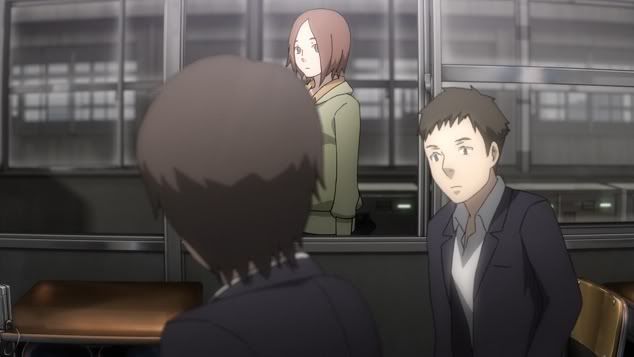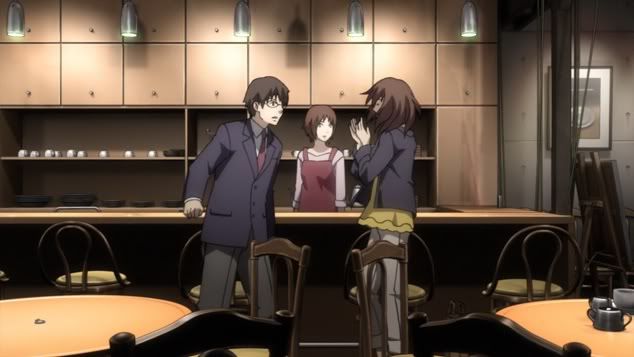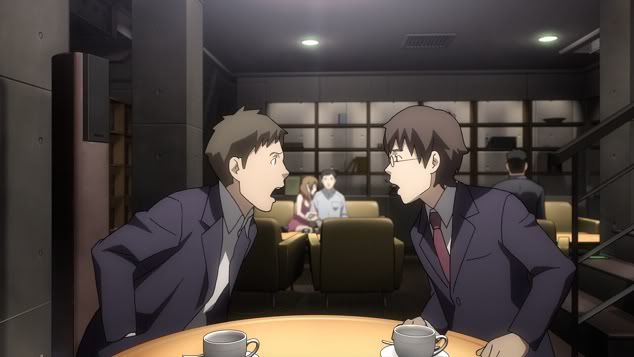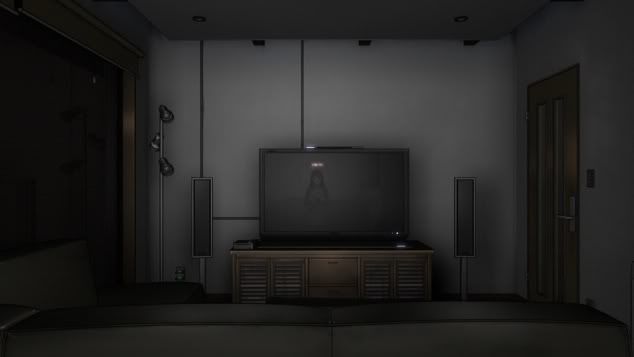Forum - View topicANN Book Club I: Eve no Jikan.
|
Goto page Previous 1, 2, 3, 4 Next |
| Author | Message | |||||||
|---|---|---|---|---|---|---|---|---|
|
wanderlustking
Posts: 449 Location: Bozeman, Montana |
|
|||||||
|
Consider this; what do you think the author wanted you to feel during scene X? How did it actually make you feel? I've written about the criticism term "the death of the author" before; in a nutshell, it means that any viewer's interpretation of a fictional piece holds as much merit (if not more) than the original creator's interpretation.
Thoughts? Does anyone think there are any scenes in which the intended message and the received message might be different? How might someone from a different country react differently than you to the same scene (or imagery or quote)? What about someone from the same country, but different background (someone less educated, richer or poorer than you, etc)? |
||||||||
|
||||||||
|
dtm42
Posts: 14084 Location: currently stalking my waifu |
|
|||||||
|
Crap, I don't think my brain is wired properly, because when I try to think of those questions I get nothing. Nothing I tell you.
I will say that I do not believe in Death of the Author, for both ideological and practical reasons. But that's neither here nor there. |
||||||||
|
||||||||
|
Errinundra
Moderator
Posts: 6525 Location: Melbourne, Oz |
|
|||||||
If you follow the link I provided on the first page to the Time of Eve Competition, writer and director Yasuhiro Yoshiura said this:
So the man himself accepts that the author is dead. This is what the winning entry wrote:
I accept Daniel Dennett's thesis that consciousness is a sort of serial narrative tying together some (but not all) of the parallel functionings of the brain. It isn't the central function, nor is it part of decision making - decisions are made at a deeper level, if you will. If he is correct there is theoretically nothing stopping us from programming consciousness into an android. The important thing would be to give correct narrative priority to incoming data, decision making and communication. Of course humans are quite fallible - it's why we make so many errors of judgement. One would expect the same with robots and androids. Like everything else we make, over time we will get better at creating android consciousness. Time of Eve is, among other things, examining this problem in a very entertaining and emotive way. |
||||||||
|
||||||||
|
infiltration.cru
Posts: 321 |
|
|||||||
|
Nice to see such an interesting thread here.
Since your post is so long, dtm42, I'll refrain from quoting it. Instead I'll just try to pick up some of the topics you touched upon. As for your question, why we should design "slaves" so akin to ourselves, I'd say simply for aesthetics. Keep in mind that we are presented with a free market situations where different manufacturers compete with each other. Sure, in the beginning there may have been no humanoid robots. But it is likely that the series takes place at a point in the future where the technology has advanced far enough to enable us to manufacture more sophisticated "products". And if you are going to convince customers to buy a "machine" that helps you in your every day life(and not too little, I'd say) you have to make it look trustworthy and somewhat sympathetic. You'd have to give the customer the impression of someone who you can relay tasks to without having to fear they are carried out faulty. When humans are in such every day situations they feel easier around other human beings. I'd rather not let my cat take over the task of brewing coffee, to be honest. So if you want to fit your robot into a human-oriented, every day environment you would naturally try to make it seem less out of place. As for their sentience I'd say that this goes with the idea that for a more sophisticated product you need more complex computers. Sooner or later their capacity is big enough to imitate childrens' learning processes: copying your surroundings, thus learning how to behave human(according to your peers). Onto another point: Instances of artificial intelligence in media often serve to pose questions of where humanity begins, what makes a human human, if a soul or mental terms really exist/s; even more so when linked to a humanoid appearance. They blur the line between the creation and the creator and in that way tackle moral dogmas that exist in every religion with a cosmogony. In a way, I think this series would be interesting to analyse from a transhumanist perspective; the setting provides at least some posthuman aspects. First off, captain obvious: androids. Beings that fuse biology and technology together and have achieved a state of mind that is generally somewhat human. Secondly: the mere existence of technology that carries out tasks independently, maybe even along with an improved efficiency compared to human beings. The question would now be: has mankind as a whole(or at least the society that is presented) evolved to a different state that it couldn't reach before? Which issues arise due to these developments? |
||||||||
|
||||||||
|
GeminiDS85
Posts: 391 |
|
|||||||
I specifically used the term “red fruit” instead of tomato in an attempt to encourage other users to draw the parallel to the apple on their own, so I apologize if it confused you or anyone else.
Now you are certainly free to express your own postulations regarding the use of symbolism in this narrative, yet I invite you to take a few minutes to ponder on how artists and authors utilize symbolism. A reoccurring criticism of anime from those who dwell in the upper stratums of academia is that anime tends to rely on relatively simple coding. While this is definitely true in many instances, several anime are able to make the leap and include slightly more complex coding in their narrative structure. For example, the utilization of an apple in a narrative that invites the viewer to draw parallels to Eve from the Bible would be an excellent example of very obvious symbolism. Now, suppose an anime creator wants to avoid using ultra-simplistic symbolism in his/her work, but, at the same time, craft the symbolism in a way that is still decipherable. If the creator has any kind of background in the fine arts, they would almost certainly be familiar with how to conjure up an image that draws many parallels to the symbol they want to slightly obfuscate. Now relating this to wanderlustking’s question regarding authorial intent, I want to point out how I came to my conclusion. Given my knowledge of the creator’s past and present work in conjunction with the article errinundra provided us, I came to the conclusion that Yasuhiro Yoshiura has a predilection for the utilization of literary devices. Now under the guise of this deduction, the use of a tomato as a once-removed symbol of the apple in the Adam and Eve myth appears to be a calculated decision by the director. However, without the director telling us that this is exactly what the tomato symbolizes, we are left to only speculate on its true meaning. That being said, it is also possible that the symbol was inserted by one of the artists working on the project without the director’s knowledge. Since the production of anime relies on the work of many individuals, meanings that are unknown or unintended by the director can, conceivably, be inserted into the final product. Perhaps one of the artists thought it would be amusing to include symbols that parallel the Eve myth in an attempt to misdirect the viewer, or maybe they interpreted the director’s intent and included symbols they thought would help guide the viewer in a certain direction. Last edited by GeminiDS85 on Thu Feb 02, 2012 10:16 pm; edited 1 time in total |
||||||||
|
||||||||
Blood-
 Bargain Hunter Bargain HunterPosts: 23769 |
|
|||||||
|
Quick question: I'd like to participate, but I'm usually too baked on weekday nights to watch the relevant episodes and then post anything cogent. Would I be breaking some Book Club rule if I didn't write anything about episodes 1 & 2 until the weekend?
|
||||||||
|
||||||||
|
Tris8
Posts: 2114 Location: Where the rain is. |
|
|||||||
|
||||||||
|
||||||||
Blood-
 Bargain Hunter Bargain HunterPosts: 23769 |
|
|||||||
|
Coo'. Then prepared to be dazzled by my penetrating insights!
|
||||||||
|
||||||||
|
Tris8
Posts: 2114 Location: Where the rain is. |
|
|||||||
So I wrote what I thought of a part of ep 2, but my browser crashed before I was finished and could submit it In the cafe, Rikuo is pretty awkward and reserved when interacting with anyone except Masaki. But at the end of ep 2 a little girl steals his glasses and he loosens up and starts having fun. Then of course the second he gets them back and puts them on he sees Sammy and the fun is over. It seems to me that his glasses may represent the lens through which he normally sees the world, his perception tinted with his bias against robots. But when the glasses come off, the world is blurred. The differences between people are blurred and become unimportant compared to the big picture. People are people. |
||||||||
|
||||||||
Ggultra2764
 Subscriber SubscriberPosts: 3876 Location: New York state. |
|
|||||||
|
Sorry for being late for the discussion. Got quite busy with things.
It looks like many points I would raise about androids within Time of Eve have already been brought up such as the their use as tools for man's convenience, why they are made to resemble humanity and the right androids have to gain sentience. I think other relevant themes that the series delves into with the androids and Time of Eve club is perception and communication. Man's perception of androids as objects becomes challenged when they go outside society's rules within the Time of Eve cafe and can't discern between humans and androids while within it thanks to the lack of halos on their heads. This makes it easier on the androids to express themselves and be treated as equals in conversation with humans without being judged from society's labels as "objects" while at the same time, humans used to this labeling of androids find themselves having to adapt to the possibility that androids are capable of behaving and expressing themselves as we do, a mentality that appears taboo in this future society judging from the news segments seen about robot addicts seen at the start of both episodes and the mystery people talking of their efforts to repress robotic sentience getting thwarted at the end of episode 2. And for those new to the series, definitely keep close tabs on the TV segments and the mystery people for later episodes of the Time of Eve. |
||||||||
|
||||||||
|
dtm42
Posts: 14084 Location: currently stalking my waifu |
|
|||||||
|
Yo Blood-, I have yet to be dazzled. Nudge nudge.
On another note, when does discussion for episodes three and four start? |
||||||||
|
||||||||
|
Tris8
Posts: 2114 Location: Where the rain is. |
|
|||||||
|
||||||||
|
||||||||
|
darkhappy1
Posts: 495 Location: PA |
|
|||||||
|
Everyone has delved into the biblical references and social themes deeper than I could ever hope to, so I'm just going to do a last-minute shift in focus towards how the insertion of androids into daily life is affecting:
A: the human/android ratio in the workforce and the ability to get jobs B: social life and what responsibilities people are (not) taking on They may not be the focus of the two episodes, but the world of Time of Eve looks to be well-crafted enough to explore and speculate about anyway. (I also want to say something without repeating other people, so...) A: The news says that the introduction of androids in agriculture raised Japan's food production rate by 80% (if I remember it correctly), so their efficiency is recognizable to anyone that watches the news. In the school, there were multiple androids walking through the hallways, carrying books and presumably going to do menial work. Androids are able to cook, clean, and do other kinds of housework, and I assume those are the primary functions of most androids for the average household. Their wide range of skills, along with the ability to follow orders accurately, must give to them the ability of handling a wide variety of occupations. That would allow restaurants, construction companies, supermarkets, and shops to eliminate at least a few people to give wages to. As companies use more androids and hire less people, there's sure to be major difficulties in finding regular jobs. Sure, there would still be full-time jobs, but they would probably be high-ranking jobs in charge of subordinates and requiring human thought, decisions, and management. The only things that could be preventing such a change are ethics groups and laws that deal specifically with these circumstances so that the economy isn't all out of shape. It's a particularly troubling matter though, especially when the limits on the use of androids in the agricultural fields isn't specified. B: The afflictions that androids have caused on daily life is highlighted with the 'dori-kei' phenomena that is not unlike the fanatical lovers of fictional characters. (The "I'm married to an anime character" people that pop up on interest articles around the internet are an extreme example that haven't been brought up in these two episodes.) However, it very obvious that most youths don't have such relationships with their androids. They continue to think that fully treating a hunk of machinery as a person is unusual. I do wonder how their social lives have been affected by these robots that make everything convenient. Their sense of responsibility has probably been lowered to today's. There is no need to carry an umbrella with you if an android can do bring it when it's raining. An android can do all of the housework too. if the android can carry a relative home after a night of partying, then there's no need to pick them up yourself. It keeps the youth in a state of carelessness, which allows them to keep socializing without worry. Then again, in the brief scenes of the city seen in episode one, there were barely any people present, perhaps because people have become more single-minded and focused. Instead of meandering, people have set destinations. There's less running back and forth to different markets, because the robot would be the one to handle those tasks. The "No Robots Allowed" areas barely had anyone crossing through them. (I think that a robot even passed through that area, assuming that the "No Robots Allowed" frame and the "guys look at some alleyway" frame was not skipping over other routes that the guys had to take.) So instead of people becoming more social in general, people have furthered whatever interests them whether it be socialization, studying, playing, etc. Anyway, it's awfully late now. My post is also awfully late in comparison to the time everyone else posted their thoughts, but at least I got one in! |
||||||||
|
||||||||
|
Tris8
Posts: 2114 Location: Where the rain is. |
|
|||||||
Those two eps were pretty funny. Especially 4, with the old model robot. One thing I started thinking about is how Nagi acts toward Rikuo and Masaki. They break the house rule all the time, yet she just gently scolds them and reminds them of the rule. She could be more firm about it if she wanted to and that wouldn't be considered rude but she chooses not to. It's like she's trying to nudge them in the right direction, guiding them down the path to understanding. |
||||||||
|
||||||||
|
Errinundra
Moderator
Posts: 6525 Location: Melbourne, Oz |
|
|||||||
|
With everyone concentrating their thoughts on android / human questions I thought I might bring up perhaps Yasuhiro Yoshiura's most characteristic theme - new knowledge breaking down old belief systems. It seems to be an obsession for him in the way that separation is an obsession for Makoto Shinkai. It is central to Pale Cocoon, played with in both Aquatic Language and Kikumana and, from all reports, will be the central theme of the upcoming film Patema Inverted. You see it happening over and over again in Time of Eve. There isn't a lot of conflict in Yoshiura's works so the tropes of discovery and paradigm-shifting are alternative methods he uses to create drama and interest. Here are some examples he has used in the first four episodes.
1. Rikuo's preconceptions about Aki overturned. 
2. Rikuo finally seeing what's been in front of his nose the whole time. His glasses are an obvious metaphor for his wilful blindness. 
3. One of several eye-popping moments for Masaki and Rikuo as they ponder the questions posed by Koji and Rina (visible in the background, as is Setoro also). 
These small personal illuminations can be viewed as paralleling the larger revolution that takes place, albeit quietly, over the entire series - the changing perceptions towards androids and the androids' changing perceptions of themselves. Anyway, I love these small moments. They make this anime special for me. *** On a different note, I had always been mystified by the moment at the end of episode 4 where Sammy is wired up to something and stares blankly at the TV screen. I never could figure out what it signified. There's a similar moment at the end of episode 3 where Rikuo walks into the kitchen and Sammy is activated from what appears to be standby mode. 
Watching the movie version finally explained to me what's going on in these scenes. I think it is worth sharing it with people who haven't seen the movie. Both scenes are expanded slightly. Sammy is running CHKDSK. While it repairs her data she dreams about events that have occured. (Nagi mentions these dreams to Rikuo at the end of episode 2.) One of her dreams turns into a nightmare. |
||||||||
|
||||||||
|
All times are GMT - 5 Hours |
||
|
|
Powered by phpBB © 2001, 2005 phpBB Group
